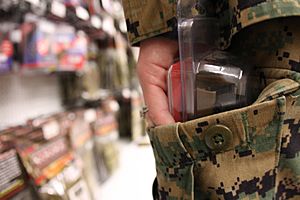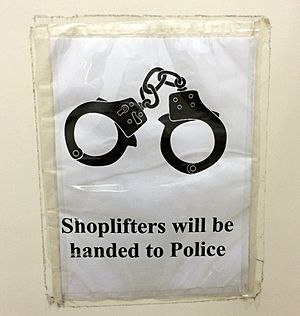Shoplifting facts for kids
Shoplifting is the theft of goods from an establishment in which they are displayed for sale, without paying for them. With clothing, shoplifters may put on items from the store and leave the store wearing the clothes.
The terms shoplifting and shoplifter are not usually defined in law. This crime is classified as larceny.
Types of shoplifting
Shoplifting usually involves concealing items on the person or an accomplice. It can also include price switching (swapping the price labels of different goods), refund fraud, and "grazing" (eating or sampling a store's goods while in the store).
Shoplifting peaks between 3:00 and 4:00 p.m., and is lowest from 6:00 a.m. to 7:00 a.m.
In the United States, shoplifting increases during the Christmas season, and arrest rates increase during spring break.
Shoplifters range from amateurs acting on impulse (snitches), to career criminals (boosters) who habitually engage in shoplifting as a form of income, reselling what they steal.
People of every nation, race, ethnicity, gender and social class shoplift.
History
The first documented shoplifting started to take place in 16th century London. By the early 19th century, shoplifting was believed to be primarily a female activity.
However, since 1980, the data suggest that males are equally or more likely to shoplift than females. The average shoplifter first did it at the age of ten: shoplifting tends to peak in adolescence then steadily declines thereafter. People of all races shoplift equally, and poor people shoplift only slightly more than rich people. Men tend to shoplift using bags, and women using strollers. When caught, a shoplifter has on average $200 worth of unpaid merchandise.
Common items
Rutgers University criminologist Ronald V. Clarke says shoplifters steal "hot products" that are "CRAVED", an acronym he created that stands for "concealable, removable, available, valuable, enjoyable, and disposable".
Commonly shoplifted items are usually small and easy to hide, such as groceries, especially steak and instant coffee, razor blades and cartridges, small technology items such as MP3 players, smartphones, USB flash drives, earphones, CDs and DVDs, gift cards, cosmetics, jewelry, multivitamins, pregnancy tests, electric toothbrushes, and clothing.
In the United States, frequently shoplifted books include ones by authors Charles Bukowski, Jim Thompson, Philip K. Dick, Martin Amis, Paul Auster, Georges Bataille, William S. Burroughs, Hunter S. Thompson, Italo Calvino, Don DeLillo, Raymond Chandler, Michel Foucault, Dashiell Hammett, Jack Kerouac and other Beat Generation writers, Jeanette Winterson, Chuck Palahniuk, Haruki Murakami, Jeffrey Eugenides, and Mark Z. Danielewski. (See book store shoplifting.)
Combating shoplifting
Shoplifting may be prevented and detected. Closed-circuit television (CCTV) monitoring is an important anti-shoplifting technology.
Stores use a number of strategies to reduce shoplifting. For example, small, expensive items are stored in locked glass cases. Large expensive items can be chained to shelves or clothes racks. Magnetic or radio sensors or dyepacks can aslo be attached to items.
Some stores have security guards at the exit, who search backpacks and bags and check receipts. Stores also combat shoplifting by training employees how to detect potential shoplifters.
Penalties
Shoplifting is considered a form of theft and is prosecuted. Retailers may also ban from their premises those who have shoplifted from stores. It is one of the most common crimes.
Penalties for shoplifting are often lower than those for general theft, because risks of false accusations are also high. Most retailers are aware of the serious consequences of making a false arrest, and will only attempt to apprehend a person if their guilt is beyond a reasonable doubt.
The 5 most common punishments for the crime of shoplifting include:
- a fine,
- placement in a diversion program,
- paying restitution,
- misdemeanor probation, and
- jail time.
People caught shoplifting for the first time are likely to be fined. Those guilty of multiple shoplifting charges, or offenders that shoplift very expensive merchandise or in large quantities, will likely face probation or a county jail sentence.
Notable cases
Accused murderer Lizzie Borden again received media attention when she was accused of shoplifting in 1897.
French writer and political activist Jean Genet was arrested in Paris for shoplifting a dozen handkerchiefs from the department store Samaritaine in 1937. Genet frequently stole from shops throughout his life, including bolts of linen, books and suits.
Actress Hedy Lamarr was arrested for shoplifting in Los Angeles in 1966. The charges were eventually dropped. In 1991, she was arrested on the same charge in Florida, this time for $21.48 worth of laxatives and eye drops. She pleaded "no contest" to avoid a court appearance, and in return for a promise to refrain from breaking any laws for a year, the charges were once again dropped.
British radio and television personality Lady Isobel Barnett was found guilty of shoplifting in 1980.
Actress Winona Ryder was arrested for shoplifting at Saks Fifth Avenue department store in Beverly Hills, California in 2001. Ryder was eventually convicted of misdemeanor theft and vandalism and became eligible for expungement of the conviction after finishing probation in 2005. Ryder was originally convicted by a jury of felony larceny/vandalism and was sentenced in a nationally televised California Superior Court proceeding in December 2002.
Former New York City Mayor Rudy Giuliani's daughter Caroline Giuliani was arrested for stealing five beauty items worth about $100 from a Sephora store in Manhattan in August 2010. She was later offered a dismissal in return for a day of community service and six months without a further offense.
British chef and TV presenter Antony Worrall Thompson was arrested for shoplifting "...three onions and two pots of...coleslaw from a branch of Tesco" in 2012 and "...received a caution" from authorities.
Dwayne Johnson used to shoplift Snickers regularly at a 7-Eleven in Hawaii when he was a teenager. In 2022, he made amends by buying every Snickers bar in that store.



